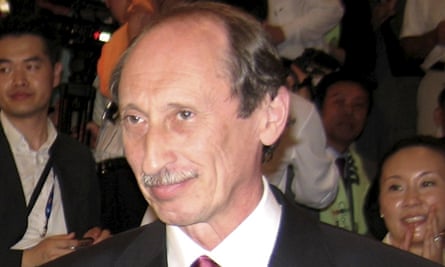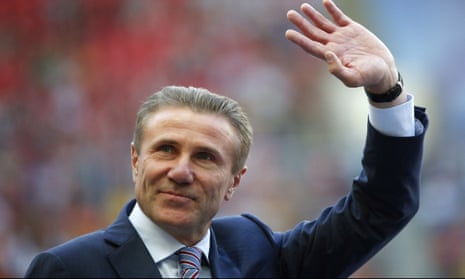A payment made by Sergey Bubka, the senior vice-president of athletics’ world governing body, to a now disgraced senior figure is to be investigated by the independent Athletics Integrity Unit, the Guardian can reveal.
Bubka, who is also an executive board member of the International Olympic Committee and an Olympic gold medallist, was reported by the French newspaper Le Monde to have paid $45,000 into the Monaco account of the Nevis-registered firm of Valentin Balakhnichev, the former IAAF treasurer and head of Russian athletics, on 18 June 2009.
A day earlier, Balakhnichev’s account, New Mills Investment Ltd, transferred almost precisely the same amount ($45,033.12) to Pamodzi Sports, the consultancy arm of Papa Massata Diack, the former IAAF marketing executive.
The documents, which have been seen by the Guardian, show that the payments were made on two days in 2009. However, there is nothing to suggest that Bubka was aware of how his payment may have been used, or that a sum equivalent to it may have been passed on, or where that sum was passed on to.
In a statement Brett Clothier, head of the Athletics Integrity Unit, said that it would be looking into the payment. “The Athletics Integrity Unit (AIU) is aware of the article published today in Le Monde in which allegations are made concerning International Association of Athletics Federations (IAAF) senior vice-president, Sergey Bubka,” he said.
“The AIU is the fully independent body that was established by the IAAF on 3 April 2017 to address all integrity-related matters in international athletics, with a remit that includes investigating allegations of misconduct involving IAAF officials. The unit will seek further information in relation to this matter in accordance with its functions under the rules.
“In order to protect the integrity of its ongoing work and cases, the AIU will be making no further comment at this time.”
The unit was set up in April to beef up athletics’ anti-doping powers and to “address integrity breaches in other areas of concern such as bribery and corruption, betting … in short combatting any and all threats to the integrity of the sport”.
Bubka, who broke the world record 35 times in a glittering pole vault career before becoming a sports administrator, has strenuously denied any wrongdoing. A statement from the Ukrainian’s lawyers, Simons Muirhead & Burton, said: “My client has no knowledge of or involvement in any alleged business dealings between Mr Balakhnichev and other parties, including Mr Diack. Similarly my client has no financial relations with Mr Diack. And the answer is no to any relationships with any bidding cities.”
On being presented with evidence of the payment to Balakhnichev, a spokesman for Bubka said: “It was for consultancy services performed by Mr Balaknichev solely in connection with and to expand the reach of the annual Pole Vault Stars tournament which Mr Bubka used to organise each year in the Ukraine until 2014.”
Pole Vault Stars was an annual competition in Donetsk, Ukraine, that began in 1990 and continued until 2014 when it was put on hold due to the annexation of Crimea.

Asked specifically about the transfer from Bubka to his New Mills company, Balakhnichev also said it was linked to a plan to expand Pole Vault Stars. “As I remember, we [were] planning to create a new event in Russia, especially in Moscow and some cities in the world, with his Pole Vaulting Stars as a series competition with [the] finish in Donetsk,” he said. Ultimately, no plans to expand the event were ever put into the public domain.
Bubka and Balakhnichev were close colleagues at the IAAF having developed a long-standing friendship when the Ukrainian was a star pole-vaulter. In an interview published on allsportinfo.ru in August 2007, before allegations of corruption and cover ups emerged, Bubka said of Balakhnichev: “We have been friends for a long time. And even, moreover, we hold the same views in life. Valentin is a high level professional and extraordinary person. He has always had lots of interesting projects, original and sometimes revolutionary ideas.”
Balakhnichev had a life ban for corruption upheld by the court of arbitration for sport in August. Diack is on the run from Interpol after being linked to corruption and vote-buying during Rio’s bid for the 2016 Olympics.
Diack remains defiant
Diack did not respond directly when asked to explain what the money from New Mills Investment was used for. The payment was received by him when the candidate cities for the 2016 Olympics presented the technical aspects of their bids at a two-day briefing for IOC members. The bid was eventually won by Rio when the vote took place in Copenhagen in October 2009.
However Diack, who has also been on the run from French financial prosecutors investigating allegations of “corruption and money laundering” involving millions of dollars from the Rio 2016 and Tokyo 2020 Olympic bids, made it clear that he felt he was being subjected to unjustified attention from the investigator Renaud van Ruymbeke.
In an email he wrote: “Please tell Renaud van Ruymbeke and his team of investigators that their inquiry will never be done via press articles, press releases and spectacular press conferences. He has to get ‘balls and brain’ and the courage to fly over to Dakar [five hours from Paris] to get formal written and official answers.” The Guardian understands that the French prosecutors have not been allowed by the Senegalese authorities to go to Dakar to question Diack, who added in his email: “Good luck for your articles. At least you’re confirming be the existence of your Caucus Group!!”
Diack also denies any corruption, recently telling Reuters the allegations were “the biggest lie in the history of world sport”.
However transactions seen by the Guardian suggest that there were a number of financial dealings between Diack and Balakhnichev while they were both senior figures in the IAAF. Not only did Balakhnichev sign an agreement with Pamodzi Sports Consultancy on 12 February 2012 for $995,000 but there were a number of large payments to and from the Russian and Diack, the biggest of which was a $2,182,000 transfer in February 2012.
Balakhnichev also refused to answer a number of questions about the transactions but in an email called them “fake news” and claimed “your western system bring to you this problem”.
He added: “Not me, not mentioned people, not private information mentioned in your letter is not right and have any communication with the 2016 bids. It’s really new fake. I don’t think that you information have this rights to be published, and your combination of information can only be a your private opinion. Don’t forget to mention about it.”
Both Balakhnichev and Diack were banned for life from athletics last year for their part in inflicting “unprecedented damage” on the sport following a 20-month investigation into corruption, blackmail and extortion involving the Russian marathon runner Liliya Shobukhova, who made secret payments to avoid being banned for doping offences.
She was asked to pay €450,000 in three tranches to the Black Tidings account linked to Papa Massata Diack in order to guarantee her participation in the 2012 Olympics Games, which she saw as the pinnacle of her athletics career. Shobukhova ran in London and subsequently in the Chicago marathon because the management of her blood passport case had been slowed down.
